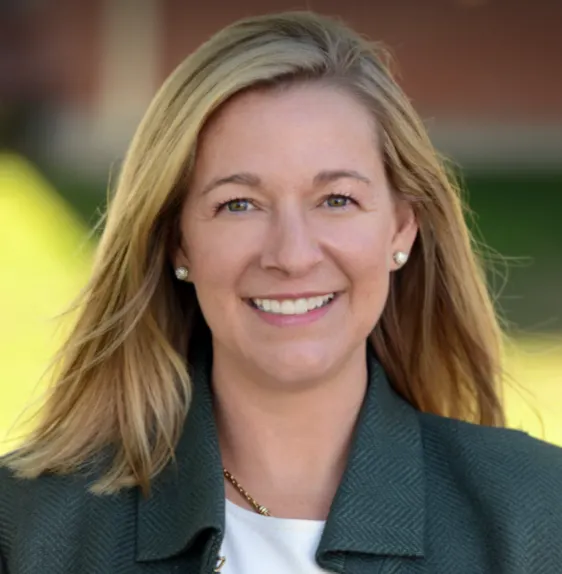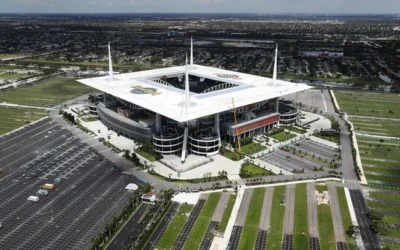As a former player turned hockey executive, Kelly Mahncke, CFO of USA Hockey, leads the finances of the nonprofit governing body of the sport she played throughout her childhood and into college.
Now, she has the best of both worlds — a financial leadership position in a dynamic organization that comes with a direct influence on how hockey in the U.S. is played, facilitated and grows from the youth level to the Olympics. With a passion for expanding the sport’s reach and accessibility, along with a strategic, metric-based financial approach, she helps ensure its continued development.
Her role is vital in shaping the future of hockey, from grassroots programs to the highest levels of competition, as the sport navigates new challenges such as officiating shortages, competition with other sports and private equity’s growing involvement at the junior level.
Kelly Mahncke

CFO, assistant executive director of finance and administration, USA Hockey
First CFO position: 2010
Notable previous employers:
- Arapahoe House
- USA Mobility
This interview has been edited for brevity and clarity.
ADAM ZAKI: What KPIs are you tracking daily, and are there any industry-specific ones that may surprise your CFO peers?
KELLY MAHNCKE: This is an area where we’ve been putting a lot of effort in lately. We’ve implemented new technology with AI capabilities to help us track our metrics more efficiently. But from my perspective, it’s a lot of the typical things most CFOs track and can relate to. I track our daily cash flows — some of that comes from the restaurant we own — but it’s everything from gross and net margin to our cash conversion cycle and, in particular, day sales outstanding.
One metric that is important to us is our returning membership numbers and our membership turnover rate. This is a key part of what we do because this number reflects our progress on our mission. If we can get a kid to fall in love with hockey at around six years old, which I would argue is the best game around, of course, we can create a lifetime member.
At the end of the day, we are a youth membership organization, though we do have Olympic responsibilities and many corporate partnerships. But it’s really about ensuring we provide value to our members over time while tracking the cost to acquire those members, the ROI on our marketing efforts, and then our operational cash flows and ratios — the things most CFOs are accustomed to keeping tabs on.
As a nonprofit, how do you approach and drive efficiency within your finance function?
MAHNCKE: One of the things I did early on was make an agreement with an auditing firm to review all our expenses. Part of the agreement was that they didn’t make any money unless they saved us money — that’s how we structured the deal — so there was an incentive to go into the organization line by line and examine our operations. That helped me and the organization as a whole get a sense of where we were financially and gave us a chance to improve elements of our operations that were relatively easy to adjust.
When I first got here, I’d walk into the office to a stack of checks every day that I had to sign by hand. Now, we have a complete expense management system. Technology has been a huge help here, but I think the ability to dive into our financial data early on and then develop a roadmap from there was important. Now, I’m very interested in technology for accounts receivable and accounts payable, so that may be our next step to help improve efficiency within our finance team.
You mentioned the Olympics. This is the bread and butter for revenue for many athletic governing bodies. Would you say the same for USA Hockey?
MAHNCKE: I know that many other governing bodies are very cyclical with the Olympics, but we are not. We do see a bit more investment in an Olympic year, but what is most important to us are the men’s world championships, especially when we can host those. That’s our thing, and it’s the most significant event for our business.
There is a major shortage of athletic officials across the country in all sports. Is this something your organization has addressed when forecasting scalability?
MAHNCKE: This is a challenge most people in sports at all levels are well aware of because it is not unique to one sport. We need officials, especially at the youth level, because, without them, there is no game. I have to commend our hockey development group because they’ve taken this challenge head-on, and we’ve been able to sustain our number of officials. We’ve recently seen some growth in our official membership numbers.
That team has focused on making the experience better for officials because we know unfortunate things happen on the ice. But we’ve listened to our members and developed resources to help them grow their careers as officials. Many want to officiate in the NHL or at the Olympics, so giving them tools, networks, and opportunities to improve has been a big help in this area.
Hockey has long been one of the most costly sports to participate in. Do you see this as a strength that fosters dedication and passion for the sport at the highest level or as a barrier?
MAHNCKE: Our goal is to make hockey available to anybody, anywhere, and give them a great experience in an amazing sport. We have a foundation that provides financial resources for equipment or introductory clinics, and this mission has been part of our organization’s ongoing strategic plan.
We have camps that strive for affordability and supply all the equipment needed to learn. We know that price is a challenge in our sport, but that challenge isn’t unique to us, as equipment, field, and ice time costs have risen considerably across the country. Sports are becoming more expensive. It’s a big business, particularly youth sports, so we’ve made it a priority to create solutions to these challenges, such as addressing equipment and travel costs.
Private equity’s interest in professional sports is growing. Has private equity expressed interest in any aspects of hockey yet?
MAHNCKE: Private equity is here, alive and well, pretty much cradle to grave in hockey. It’s not universal, but some junior teams have private equity investors, and some youth teams do as well, as they provide the capital to build better facilities and grow leagues.
It hasn’t impacted the higher levels of our sport as much as it may impact others in the near future, but our junior teams have private owners who see these teams as scalable, for-profit businesses and are willing to take on investors.





